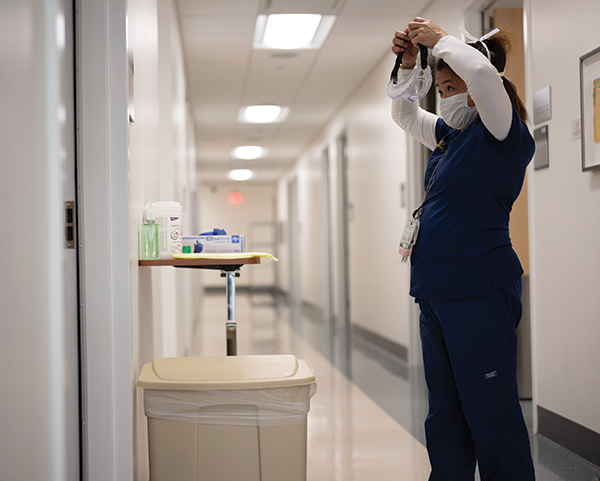
Coronavirus crisis
Continuing education for alumni
The COVID-19 pandemic brought life as most know it to a screeching halt. Meeting the demands of screening patients, wearing the appropriate personal protective equipment (PPE) and constantly changing directives challenged all health care workers. Yet serving patients and their families in routine ways never stopped.
Change requires a mindset where established protocols and new agility must coexist. Thriving in the new environment forced graduates from the Betty Irene Moore School of Nursing at UC Davis to put their education into practice.
“Every single second of every day was rapid-cycle change. We were constantly realigning everything based on new information,” recalls Angelique Silva, an alumna of the master’s-degree leadership Class of 2016. “We assessed the literature on what was happening across the country and in other countries, which brought changing nuances to our routine and workflows.”
After 18 years as a labor and delivery nurse, Silva found herself in uncharted territory. As the unit’s perinatal nurse educator and safety specialist, she led UC Davis Medical Center’s rollout of universal COVID-19 testing upon the arrival of all expectant mothers the family members or caregivers supporting them at delivery. She also chose to be transparent with her colleagues and include them in the decision- making process.
“I remember clearly in many of my School of Nursing classes, we talked about rapid-cycle change, the importance of understanding who your stakeholders are and adapting based on their needs,” Silva says. “The leadership skills I acquired during my graduate program enabled me to aim my workflow and decisions at the people who are affected the most.”
Considering all stakeholders in decision making was also at the forefront for Audra Flynn, a Class of 2013 master’s- degree leadership alumna. She pressed into what she learned in Associate Professor Elena Siegel’s implementation science class about the Bronfenbrenner Ecological Systems and how to examine relationships within communities and the wider society.
“We looked at it from a human eco- logical perspective. I used the framework to identify what was going on at each level — national, state, local, within our UC Davis Health community and at the patient level,” explains Flynn, who serves as nurse manager for Home Care Services at UC Davis Health. “With so many people and groups affected in so many ways, I had to examine everything and ultimately determine how it applied to our delivery of direct patient care.”
From participating in her department’s incident command center for the first time to increasing the number of home-health visits when other systems suspended service, Flynn is proudest that her team’s care for patients in the community was never compromised.
“For me, the coronavirus crisis really provided me with a deeper value and understanding of the responsibility of providing care in the community during the most challenging of times,” Flynn says. “We worked with a collaborative group of internal nursing experts to provide informational resources, enhanced communication, and promotion of safe transitions of care for COVID-19 patients to other community agency partners.”
Understanding the challenges faced by patients and other community agencies allowed alumni, like Flynn, to provide the care and support needed in trying times. The crisis also confirmed for those leading on the frontlines of uncharted territory that their School of Nursing education prepared them for times such as this.
“There’s always that notion that you’re not ready. The imposter syndrome is always there,” says Chidinma Ukah, a family nurse practitioner from the Class of 2018 who works in primary care. “But my gut tells me I got what I needed. Two years in practice and how I’ve faced this pandemic confirm I was right.”

